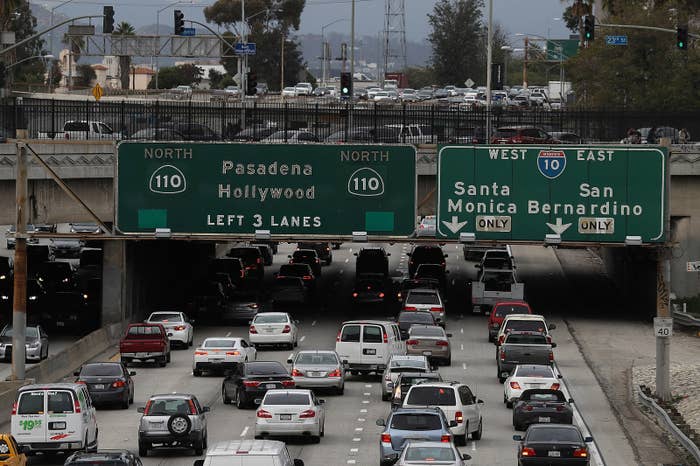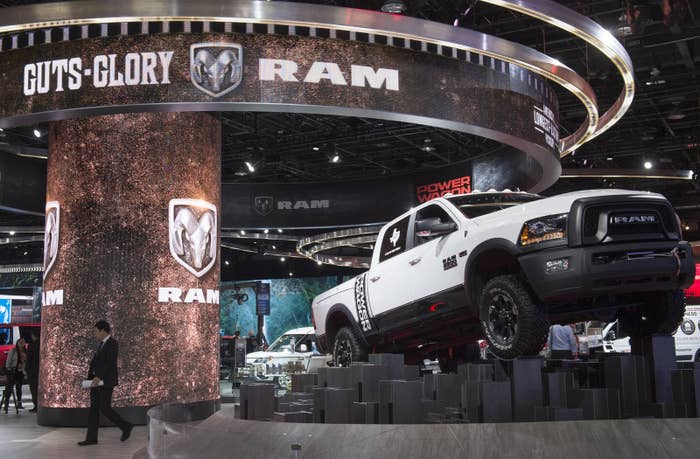
It has all the makings of a legal prize fight: In the red corner, the Trump administration, backing auto manufacturers that argue vehicle fuel efficiency standards will cost billions of dollars. In the blue corner, the state of California, which is determined to press ahead with its plans to curb gas guzzlers and promote electric vehicles.
The Trump administration is expected shortly to announce a review of Obama-era federal standards that require car makers to increase the average fuel efficiency of new vehicles to 54.5 miles per gallon by 2025. The Environmental Protection Agency may also attempt to revoke legal waivers that allow California to set its own tougher standards on fuel efficiency and the adoption of electric vehicles. These standards can then be followed by other states instead of those set by the federal government.
US car dealers expect to sell more than 17 million new vehicles this year. Right now, states that follow California’s lead account for about a third of the market for new cars, SUVs, and pickup trucks. This means the Golden State can force the auto industry to roll out cleaner vehicles — whatever happens at the federal level.
“If automakers want to play in one-third of the market, they need to comply with California’s regulations,” David Keith of the MIT Sloan School of Management, an expert on technology adoption in the industry, told BuzzFeed News.
Any attempt by the Trump administration to remove California’s current waivers is sure to spark a legal fight. “That’s a major assault on California’s sovereignty,” Ethan Elkind, who heads the Climate Change and Business Program run by the law schools at the University of California, Berkeley, and UCLA, told BuzzFeed News.
It’s a fight that auto manufacturers are urging the federal government to take on. In January, Ford CEO Mark Fields told Donald Trump in a meeting at the White House that federal fuel efficiency standards risk more than a million American jobs.
That conclusion comes from an industry-backed analysis that critics argue is seriously flawed. Still, nobody disputes that the car market has changed since the standards for model years from 2017 to 2025 were set back in 2012, when gas averaged $3.60 a gallon. Today, it’s $2.31.
“One of the major surprises has been gasoline prices are lower than we thought they’d be,” Joshua Linn, an energy economist with Resources for the Future (RFF), an independent think tank in Washington DC, told BuzzFeed News.
Low gas prices not only encourage people to drive more, they also change the vehicles that are sold. The market for SUVs and pickup trucks is now booming, with many consumers opting for high-performance, gas-guzzling models.

The federal fuel efficiency standards take account of the size of vehicles sold, shifting the average required miles per gallon downward if people buy more larger vehicles. But the demand for high-performance models will require manufacturers to invest more heavily in fuel-efficiency technology.
The disagreement is over how much that will cost.
The claim that the fuel efficiency standards threaten more than a million jobs comes from a study from the industry’s own Center for Automotive Research, based on an assumption that meeting the standards will cost $6,000 per vehicle sold.
That’s grossly inflated, and based on an outdated study from 1991, according to the International Council on Clean Transportation, a nonprofit working to improve energy efficiency. Studies by the EPA and the National Highway Traffic Safety Administration, used by the Obama administration to rule in January that the standards for model years 2022 to 2025 didn’t need to be adjusted, put the figure at $1,565.
There are also the wider benefits to the US economy of having cleaner, more efficient vehicles — which include knock-on effects like reduced costs of treating lung diseases as well as the direct benefits of spending less money on fuel.
An RFF study led by Linn, released in September, concluded that low gas prices have increased the industry’s cost of complying with the federal fuel efficiency standards by about $500 million per year. But that was just 9% of the overall net benefits of the standards, which means that the US economy would likely suffer if they were relaxed.
Still, the auto industry seems to have the ear of Trump administration — setting the stage for a confrontation with California.
California’s unique authority to set its own vehicle emission standards dates from 1967. It was allowed because of the state’s historic problems with air pollution from vehicle tailpipes — which threatens the health of millions of people in the Los Angeles area.
This wouldn’t be the first conflict between the Golden State and the federal government over vehicle emission standards. In December 2007, the administration of George W. Bush decided to reject a waiver request from California to enact its ambitious plans to reduce greenhouse gas emissions. But the conflict was resolved before the courts made a final ruling, after the Obama administration decided to bring federal fuel efficiency standards into line with California’s.
California’s current waivers, granted by the Obama administration in 2012, would allow the state to retain its fuel standards even if they are rolled back at the federal level. They also allow California to boost sales of fully electric vehicles, powered by batteries or hydrogen fuel cells, beyond 15% of all new vehicles sold by 2025. Oregon and eight northeastern states have also joined this Zero Emission Vehicle program.
For the federal government to revoke existing waivers would be unprecedented. “I don’t how you can do it without conflicting with the Clean Air Act,” Daniel Sperling of the Institute of Transportation Studies at the University of California, Davis, told BuzzFeed News.
The act says that California should be granted waivers as long as it can demonstrate “compelling and extraordinary conditions” requiring it to exceed federal standards.
California’s political leaders argue that public health and the threats posed by climate change justify California’s aggressive standards — and the state legislature has hired a high-profile legal gun, in Obama’s former attorney general Eric Holder, anticipating conflicts with the Trump administration on this and other issues.
“It will be definitely be litigated,” Elkind of UC Berkeley and UCLA said.
